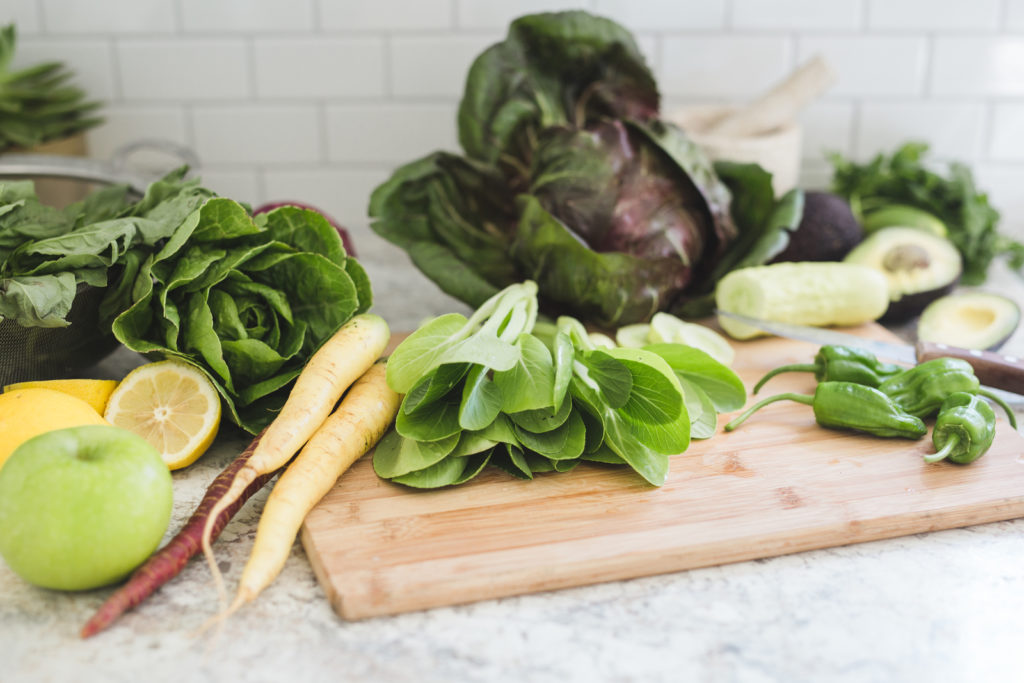
Better digestion is one of the major keys to balanced hormones improved overall health. It just makes sense, doesn’t it? The better your digestion, the more nutrients you absorb from your food. Every cell in your body needs nutrients to do its job. If your body is not well-nourished it can’t do its jobs very well and everything starts to suffer: your energy, sleep, mood, skin, immune system, and more.
Digestive upset is one of the most common complaints in society today. Just take one look at the shelves of your drug store stocked with products for heartburn, diarrhea, upset stomach, indigestion, and acid reflux. Not to mention all the commercials on TV for such products. Like most symptoms, these are messages from our body that something isn’t quite right. And these particular symptoms point directly to the digestive system needing some love and support.
Do You Need to Take Steps to Better Digestion?
How many of these symptoms have you experienced in the last few weeks or months?

- acid reflux
- indigestion
- bloating
- heartburn
- upset stomach
- diarrhea
- gas
- low energy
- moodiness
- cravings
If you can check off even just one or two of these symptoms that you experienced more than one time in the past few weeks, your digestion needs some attention. You can start showing your digestive system a little love with these 8 simple steps:
8 Steps to Better Digestion
1. Chew Your Food
Not chewing your food enough is the number one reason for reflux and digestive upset. Chewing allows for more saliva to be mixed into your food. Saliva contains enzymes for digesting carbohydrates. Also, it has beneficial bacteria and the appetite-regulating hormones leptin and grehlin. Chewing your food sends signals to the body to prepare it for the types of nutrients it is about to receive. So the more you chew, the better. Chewing each mouthful 30-40 times is ideal. There is even one study which found that chewing 40 times (instead of just 15) helped participants lose weight!
2. Take Time to Enjoy Your Food
Too often we are in a big rush and gulp down our food as quickly as we can. That usually means not nearly enough chewing! But it also means that we are eating under pressure and stress. And that actually slows down our digestion a lot. Food is meant to nourish our body and by enjoying our foods, we will benefit more from them while lowering our stress levels as we relax and eat. So take at least 20 minutes to eat, longer if you can. Relax. Breathe. Enjoy.

3. Eat Smaller Meals More Often
This reduces stress on the digestive system and can also be helpful for individuals who are trying to lose weight. It is also helpful for blood sugar. Eating until you are full stresses the digestive system. So plan to eat until you are about 80 percent full. This satisfies appetite, nutrient needs and does not put as much pressure on the digestive system.
4. Food Sequencing
Try eating vegetables first and the carbohydrates and protein last. Fruit should be consumed alone or can be eaten with the vegetables. This allows the vegetables and carbohydrates to move more quickly through the stomach to get to the small intestines where they will be digested. Meat and fish protein need to spend more time in the stomach. By eating these last, they can spend the time they need in the stomach alone which will aid digestion.
5. Salads and Fermented Foods
Eating salads or fermented foods with meals will help digestion. These foods contain enzymes and acids that can be very helpful to digestion.
6. Drink Less With Meals
Too much liquid dilutes stomach acid and fills the stomach cavity with more volume, which can lead to reflux. It is similar to eating too much. If a stomach is too full, it does not matter whether it is from liquid or solid food. You can sip some liquid, such as wine, as it is a fermented beverage with enzymes and was designed to be sipped with meals. Also, water can be sipped in small volume.

7. Digestive Enzymes and Probiotics
Try digestive enzymes and/or probiotic supplements. These can help improve digestion and absorption. Many of my clients use these for 2 to 3 months, then as they improve their digestion through nutrition and lifestyle habits, they find they no longer need these supplements daily.
8. Food Sensitivities
Determine whether you have a food sensitivity. It may not be permanent and does require a lot of gut health work to fix. However, in the short-term, you can temporarily improve digestion by reducing your exposure to any food sensitivities.
The key is to not make assumptions. Do not listen to common beliefs about specific foods. We are all different and there is nothing worse than pulling out a food because it is a fad to do so. This just complicates your life and causes you more stress (which is bad for digestion).
Instead, keep a food journal. Write down what you eat, the time you eat it and how you feel both physically and emotionally throughout the day. This can help pinpoint how and when you should eat and if any particular food may be bothering you. Do it for 2 weeks.
Also paying attention to how you feel on busy work days as compared to relaxing days off can be enlightening. It can show what stress is doing to you.

Consult a nutrition professional for assistance with food sensitivities. You can book a Clarity Call with me to discuss your concerns.
Leave a Reply